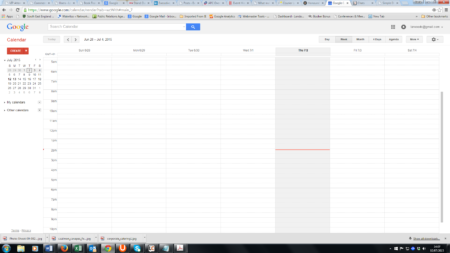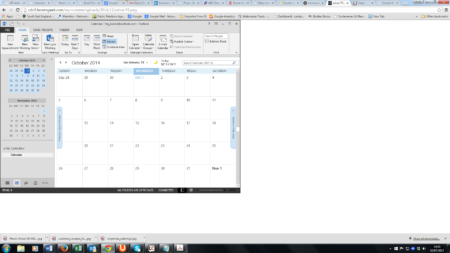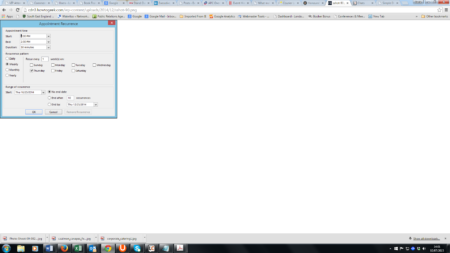Tips for Successful Diary Management

You think that you have done a great job squeezing in that last minute meeting into your boss’s diary until you realise with horror that he is booked into a meeting in Manchester at 1pm and one in London for 1.45pm. Sounds familiar? I am sure it has happened to us all some time or another.
What exactly is it that makes for good diary management skills? When it comes to it, the ultimate goal is to use yours and your boss’s time as effectively as you possibly can. Just remember, by being organised and structured in your approach, whether you are using Outlook or Google Calendar, you will achieve so much more.
In order to manage a diary effectively, you need to know and understand your boss’s preferences:
- When is he happy to start meetings i.e. 7am for breakfast or does he prefer evening drinks instead?
- Is he happy to accommodate an early start with a late meeting at the end of the day? Or does he prefer one or the other?
- How many lunch meetings per week?
- Does he prefer to keep Friday afternoons free?
There will be many more points that you can add to the above, but these are just to give you a starting point. The more you know about your boss’s personal preferences the easier it is for you to take control of his diary management and meet his expectations. It will also reduce the likelihood of having to reschedule meetings, which can give the impression of being disorganised.
Here are a few ways for you to add clarity and structure to your diary management.
All day event
By selecting ‘all day event’ the entry will appear across the top of your calendar on the chosen day or can be extended to cover as many days as you choose. Schedule meetings, conferences, bank holidays, school holidays and even birthdays or special occasions as all day events.
You can use this feature to keep track of meetings that your boss does not necessarily need to attend, although he does need to know the meeting is scheduled to take place. By adding them as an ‘all day event’ they have easy access to see for themselves any meetings that have been confirmed without needing to ask ‘have you organised X meeting? It’s a great communication tool and gives all the background details including who/where/when/what etc.
Colour code
This has the functional purpose of having a screen easier to read. Assigning colours to appointments means you can see at a glance what sort of day your boss has, whether anything needs to be re-arranged, whether you need to prepare an itinerary or travel arrangements for an offsite or whether you have a nice quiet day ahead.
Start off by thinking about the types of meetings/diary entries you will have and then using the ‘categories’ tab set up a new ‘category’ (i.e. colour) for each type of entry. These could be:
Apologies given/not attending
Hold/keep free for possible meeting – awaiting confirmation
Information re managers (e.g. on leave)
Reminders
External meeting (meeting off site or with external person)
To be moved
Committee
Travelling
Internal meeting – flexible
Internal meeting – cannot be moved
Personal
Using this system, you will know just by looking at the diary and without even reading details of appointments, what you have to do in preparation.
Recurring meetings
If there is a weekly, fortnightly or monthly meeting, or a yearly occurrence, Outlook will automatically update this for you without you having to go in an enter each individual appointment. Simply use the recurrence button from within the appointment. This is perfect if you want to make a note that at a certain time each year you need to raise an invoice, arrange an event etc and for weekly meetings/catch-ups.
Being able to delete items without having to cross them out is ideal for when you have several possible dates for a meeting. It is not uncommon for someone to send a group of a list of five or six dates for a meeting trying to work out which one is the most suitable. You check the diary, reply saying which one your boss can do and then need to record the times in the diary so that you don’t use the time for something else. Outlook is ideal for this as you can enter all possible dates into the diary and then when the date is confirmed you can delete all that are no longer required. As Outlook allows other users to view your free and busy time through the ‘scheduling assistant’, blocking out the times the meeting may take place prevents others trying to book another meeting.
Think about what is either side of the meeting as no one can be in two places at once. Although this is a standard thing to consider whatever diary management system you use, Outlook makes this easier. Don’t just look for gaps in the diary to see when to schedule a meeting, but think about what is happening either side of that meeting. Has your boss already had two late evenings that week? Have you already arranged a meeting away from the office in the middle of the day? If so, will your boss want to come back to the office afterwards or go straight home.
Schedule travel time
By scheduling ‘travel time’ into the diary your boss will always know where he is supposed to be and how he is going to get there. If the meeting is taking place thirty minutes away from the office, allow for this travelling time by scheduling it into your diary. Similarly if flights or trains have been booked, all the timing and supporting confirmations can be added directly to the calendar entry.
Block time out for work
It is very easy for diaries to become crammed with meetings, not leaving your boss any time in the office working on things he has to do. If you know that your boss has a lot on, try and identify some times in his diary that you can keep clear for him to work on these. You can block them out in the diary so that the time doesn’t get taken up with more meetings.
If possible, try to keep the diary as yours, with only you putting in meetings and events as it will be much easier for you to stay on top of, rather than letting your boss put things in too.
Related Posts

A Corporate Christmas Party with a Difference
Do you dread the company’s Christmas party invitation arriving on your desk? Tired of soggy sausage rolls, lukewarm turkey, and limp vegetables, coupled with making small talk over a glass…

Electric Flamingo Christmas Party
In the dark days of winter, London becomes a canvas of sparkling lights, festive decorations, and joyous celebrations. Among the myriad of events, the Electric Flamingo Christmas Party at The…

Le Sorelle Barge in London
Discover an unparalleled blend of historical charm, luxury, and modern comfort aboard Le Sorelle, an extraordinary 1950s barge conversion nestled in the heart of Canary Wharf. Crafted with reclaimed wood…

Finding the Perfect Gallery Venue in London
Finding the perfect gallery venue for an event offers an inspiring environment that can greatly enhance the creative experience. These spaces are specifically designed to showcase artistic work, providing optimal…



